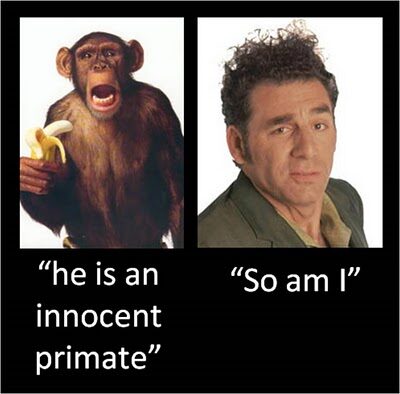We now conclude considering part of the American Humanists Association’s “Interesting Facts You Might Not Know”: “Without a god, why be good at all?”
We now pick up where the last segment ended.
3) It is an argument to embarrassment: The only answer to the premise “Without a god, why be good at all?” was a presupositional assertion, “Because you know you want to, anyway,” this was the only “why” offered. To the next logical question, “What if you are wrong and I do not want to?” the argument to embarrassment rears its ugly head. You would want to be good “Unless you were born a sociopath or had your natural sensibilities destroyed in childhood.”
But why? One does not have to be a sociopath in order to simply not care or mere be self-interested. Or what if I want what others have and thus just take it from them? Or what if I do not have a specific belief I consider my own moral concoction superior to yours and thus, do that of which I approve but you do not?
The point about us being social primates is certainly simplistic as it does not seem to take into account that chimpanzees, bonobos, gorillas, baboons and the like war over territory, food, mating—and do not forget the flinging of fecal excreta. But the claim is that “they have basic feelings of empathy and sociality built in…These animals don’t get their social behavior from Scripture and neither do you. Morality finds its roots in human nature.”

It may perhaps be likewise argued that God has likewise infused such social creatures with morals “built in” so that they need not “get their social behavior from Scripture.” Yet, I do not believe that it is necessary to do so. Certain actions buttress societal living and there is no reason why animals and humans should not share these certain traits—we have imperatives that make certain acts immoral while they do not.
I am prepared to argue that while is it certainly possible, let us even grant say that it simply is a fact, that we are social primates and learn morals by experience and experimenting with different social constructs, etc. According to this scenario what God did was to declare which naturally-built-in-human-nature impulses are moral and which immoral—we have various impulses and must discern between them.
Lastly, there is no reason to infer relation, evolutionarily and thus morally, to “other” social primates simply because the exhibit “basic feelings of empathy and sociality.” Both we and they must be social to some degree and so we all function according to that which facilitates social relations.
“These animals don’t get their social behavior from Scripture and neither do you” is the very height of this fallacious statement. Speaking for myself (and many, many people whom I know) the betterment of my moral life was not due to being taught in science class that the universe was an uncaused accident, that life came from non-life when lightning struck a swamp and I was nothing but a glorified animal, just another social primate. It came about when I ascertained that the Bible is God’s word and sought to follow the very ethical promptings against which I had for so long rebelled.
The bottom line in this case is that atheists can make whatever semantic moral statements that they with but only theism provides a foundation for morality as well as justice.
Perhaps we may state, “Yes, humans can learn about life in group just like any social animal but some of those actions which are thusly learned as still to be considered immoral.” Some in the group will horde, some share, some will feed the poor, some will eat the poor, some will be promiscuous, some monogamous. If you know anything about Darwinian philosophizing each and every, all actions, are considered to play a beneficial part in our evolution (Sam Harris made such a claim about rape).
In this view God parsed human actions into, let us say, morals and ethics: with morals referring to the mores which merely describe what human are doing and ethics referring to the ethos which prescribes what humans should do.
Bill Vallicella, the Maverick Philosopher, offered a very interesting and succinct observation in his post Are Atheists Evil? Bad Reasoning in Sam Harris (see that post’s comments section 5.22.2007 12:26pm):
Imagine a situation in which A is in a position to impose his will on B (by raping and murdering her, say) and that A will “get away with it.” (No one cares about B, they are far off in the wild, etc. We may imagine that A will die in a month from cancer.) In this situation, does A have a reason not to rape and murder B, a reason to not gratify himself? If there is no God, and no surivival [sic] of physical death, what reason could A have? Because it is wrong in the abstract for A to rape and murder? That will strike A as a joke.
“You are going to oppose to my real and furious lust an abstract moral demand that hangs in the air with no way of being enforced??” This is one way to focus the question that people like Harris and Shermer apparaently [sic] don’t grasp.
The consideration of mores versus ethos touches upon a common atheist misconception, particularly Christopher Hitchens, who think that it is ridiculous to claim that God gave the Ten Commandments since surely, people prior to the Ten Commandments know that murder, lying, etc. were wrong. What God was doing is building a nation from the ground up from a group of people who had been institutionalized due to centuries of slavery in Egypt (more details on this are found here); do they really fail to note that it is the Bible that tells us that Moses fled Egypt after committing murder?
The problem is that atheists seem to think that when Judeo-Christians refer to “absolute morality,” “moral law,” “moral code,” et al, they are referring to a set of statements such as the Ten Commandments. But what is being referred to in such cases is God’s will, God’s nature, God’s promptings, God’s potency in establishing and administering morality, God’s holding us accountable, etc. (see Is There a Common Misconception Regarding Absolute Moral Claims?).
Clearly, leaving human action to be guided by social primateism and human nature alone has produced results which are generally agreed upon to have been deleterious. Moreover, human nature is clearly not animal nature: a lion wants to kill a zebra (note that it does not murder a zebra) but it does not want to kill every zebra. It does not hate zebras for any reason (such as different color fur). No, in fact, the lion wants zebras to be healthy and plentiful. The lion will thus share territory and resources with zebras. Not so with humans.
Now, the claim that “No specific belief is necessary for goodness” is not specific enough as you may not necessitate any specific belief in order to end up doing good but it does require a specific belief in order to define goodness to begin with. And this is where the contention betwixt humans comes into play. For example, some claim that it is good to love your neighbor, other claim that it is good to blow up your neighbor. Being “good” can mean anything when left to primateism and human nature—just consider some real life examples that I provided in the post “A Good Person” and Atheism On Meaning and Purpose . It is the basis upon which we determine what “good” is that will then determine what we determine to be “good.” Is something good because an atheist claims that it is good or does the atheist claim that it is good because it is good?
God places moral urgings and a conscience within us all believer or unbeliever. The atheist is making an argument for God’s superfluousity within God’s universe. Thus, regardless of theology or lack thereof we “all have the same sorts of ethical notions and feelings.”
However, it may be of interest to note a parable in this regard: A man fell into a well. Krishna walked by and said, “Your karma determined that you fall and I will not interfere with karma.” Buddha walked by and said, “This world is an illusion both ‘you’ and that well. Cease from desire and you will cease from suffering.” Confucius walked by and said, “Confucius says, ‘One ought not fall into such wells.” Muhammad walked by and said, “Alas, it is Allah’s will that you fall into the well.” The Darwinist said, “Only the unfit would fall into a well; you are not meant to survive.”
Jesus walked by and yelled, “Take may hand, I will save you!”
~~~~~~~~~~~~~~~~~~~~
With regards to good social primates I simply could not help it…
From Seinfeld’s “The Face Painter,” episode, May 11, 1995
Kramer: Hey, Jerry? You’re a smart guy, right?
Jerry: No question about it.
Kramer: Alright, you know I’m supposed to go on this special tour today with George’s girlfriend.
Jerry: At the zoo?
Kramer: Yeah, but before I met up with her, I stopped to look at the monkeys, when all of a sudden I am hit in the face with a banana peel. I turn and look and there is this monkey really laughing it up. Then someone tells me that he did it. Well, I pick up the banana peel and I wait for that monkey to turn around.
And then I whap let him have it.
Jerry: Kramer, you threw a banana peel at a monkey?
Kramer: Well, he started it!
Jerry: It’s a monkey, Kramer!
Kramer: Well, he pushed my buttons, I couldn’t help it, Jerry.
Jerry: Well, I still think it’s wrong.
Kramer: Alright, alright, fine. You take the monkey’s side, alright, go ahead.
Mr. Pless: Ah, Mr. Kramer?
Kramer: Yes.
Mr. Pless: Thanks for coming.
Kramer: So, uh, what did you want to see me about?
Mr. Pless: Well, Mr. Kramer, to get right to it, we’re having a bit of aproblem with Barry.
Kramer: Barry?
Mr. Pless: The chimpanzee.
Kramer: Oh. Well, uh, what’s the problem?
Mr. Pless: Well, he’s not functioning the way he normally does. He seems depressed. He’s lost his appetite. He’s even curtailed his autoerotic activities.
And we think this is directly related to the altercation he had with you the other day.
Kramer: So, so what do you want me to do?
Mr. Pless: Well, frankly we’d like you to apologize.
Kramer: Yeah, well he started it.
Mr. Pless: Mr. Kramer, he is an innocent primate.
Kramer: So am I. What about my feelings? Don’t my feelings count for anything? Oh, only the poor monkey’s important.
Everything has to be done for the monkey!…

